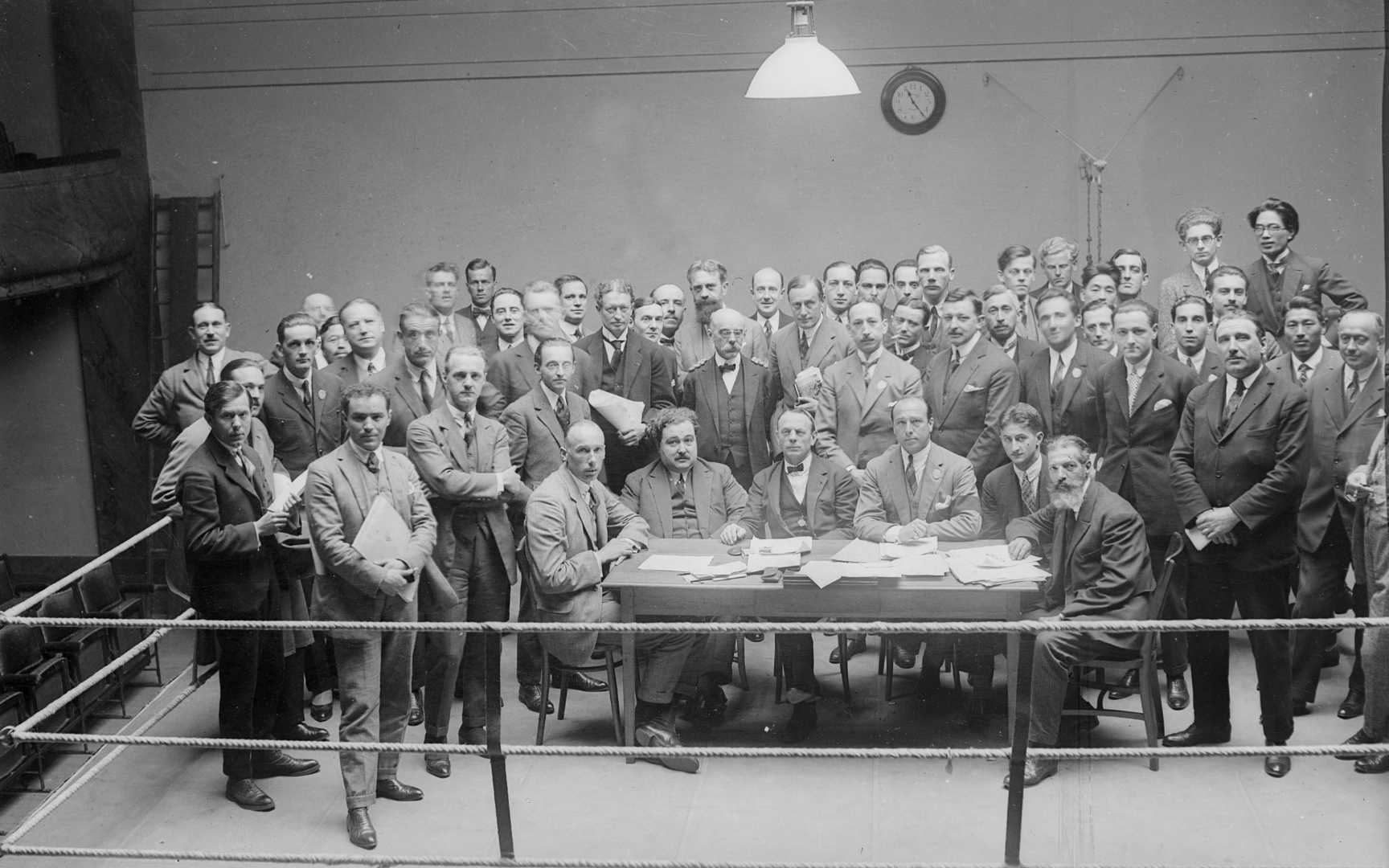
THE BIRTH
That day, our history began. The Founding Congress of AIPS was then concluded on July 3, two days before the Opening Ceremony of the Paris 1924 Olympic Games.
Eighty journalists representing 29 countries attended the first official AIPS gathering convened by renowned French journalist Frantz Reichel – who was also the secretary-general of the organizing committee of the 1924 Paris Olympics – and his Belgian counterpart Victor Boin, the secretary of the press committee at Antwerp 1920 and first person to recite the Olympic Oath at the Opening Ceremony.
It was at Antwerp 1920, the first Olympics after the devastation of World War I that the idea of an international body representing sports journalists was first mooted. There was an increasing popularity of sports journalism as more and more journalists began to specialise in the coverage of sports events.
In the words of Boin, as was found in the 1964 Yearbook marking the 40th Anniversary of AIPS, Reichel “suggested setting up an International Association for the defence of the ethical and material interests” of sports journalists.
However, the idea did not gain enough reception to take off that year.
FIRST OFFICIAL EVENT
The historic first official event of AIPS was held under the chairmanship of Henry Paté, a former rugby player who was at that time a Member of the French Parliament for the Seine District and chairman of the sports group at the French National Assembly.
Out of the 29 countries in attendance, only eight countries at the time already had national sports journalists associations; Austria, Belgium, France, Germany, Hungary, Italy, Poland and Sweden.
A provisional governing board was formed, as well as two Statutes Commissions; one for the statutes of the association and the other for the statutes of the sports journalism profession.

FIRST PRESIDENT
The second session of the inaugural AIPS Congress on July 3 was attended by delegates from 18 countries. The Statutes were discussed and put to the vote. And finally, elections were held.
François Étienne Reichel, better known as Frantz Reichel, the most representative figure in French sports journalism and an Olympic gold medallist, was elected as President. He was considered the best man to “steer the ship that had just been launched and was preparing for a long voyage through the storm-tossed waters of world sport.”
The first AIPS Executive Committee also comprised four Vice-Presidents: Victor Boin (Belgium), André Glarner (Great Britain), Tosaku Kinoshita (Japan) and Erik Pallin (Sweden); Secretary General Georges Bruni (France); Deputy Secretary Henryk Szatkowski (Poland); Treasurer Th. Lesturgeon (The Netherlands); and Ordinary Members: Wilfredo Cazo (Argentina), Albert Mestdag (Belgium), Tchavdar Stotoiloff (Bulgaria), William H. Ingram (Canada), Orlando de Simeros (Cuba), Vilem Heinz (Czechoslovakia), Vaucher (Egypt), Narciso Masferrer (Spain), Fabio Orlandini (Italy), Bob Sighetokou (Japan), Peter Christian Andersen (Norway), Janusz Smogorzewski (Poland), Paulo Osorio (Portugal), Keppich (Romania) and Torsten Tegner (Sweden).
AFTER REICHEL
Reichel’s successful first term in office led to his re-election at the Amsterdam Congress. He was unfortunately unable to finish his second term, as he died suddenly in his office at “Le Figaro” only three months short of completing it.
Victor Boin was elected as his successor in Ostend for the period of 1932-1936. A three-time Olympian with two silver and one bronze to his name, Boin was also a high-profile Belgian sports journalist who obtained his first press card at 17 years old.

VICTOR BOIN
Boin was AIPS President until 1956. However in 1939 after the start of World War II, the activity of AIPS was suspended and the Executive Committee dismissed.
He would become President of the Provisional Bureau established at the end of the war in 1945, before being elected for a third term at the London 1948 Congress.
The author of the AIPS History Book, José Maria Lorente visited Boin in Brussels in January 1974 to invite him to the AIPS 50th Anniversary Congress, which took place in Torremolinos, Spain. While Boin couldn’t attend on the grounds of his age, he sent a message in which he recalled the origin of the association:
“It was an event of great importance for the future of the world’s sporting press… a kind of enrolment battle cry summed up in these words: ‘Be heard, be understood and be united’.”
Boin died on March 31, 1974, a day after the close of the Congress in Torremolinos.
CONGRESSES
The 100th Anniversary Congress of the Association took place in Santa Susanna, Spain from April 28 to May 2.
It was the 86th AIPS Congress.
PRESIDENTS
There have been eight Presidents in the history of AIPS: Frantz Reichel, Victor Boin, Henri Schihin, Felix Levitan, Frank Taylor, Enrico Crespi, Togay Bayatli and the current President Gianni Merlo, who took over in 2005.

CORE OBJECTIVE
Headquartered in the Olympic capital, Lausanne, Switzerland, AIPS has more than 9,500 members across 160 countries divided into four Continental Sections.
And to mark its founding, July 2 each year has been designated World Sports Journalists Day. A core objective of AIPS is to enhance the cooperation between its member associations in defending the values of sport and the professional interests of members.
YOUNG REPORTERS
To the next generations of sports journalists AIPS offers a unique opportunity to improve their knowledge and skills through the prestigious AIPS Young Reporters Programme organised in collaboration with top international sports federations and AIPS partners.
AIPS AWARDS
In 2018, AIPS launched the highest international accolade in the sport media industry, the AIPS Sport Media Awards. The Awards are a celebration of sports media excellence, recognising the very best sport storytellers across all media platforms.
Credit: AIPS Media



